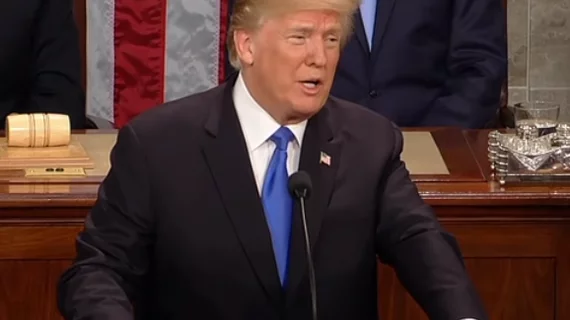Will AI be a part of Trump’s State of the Union address?
President Trump is scheduled to deliver his State of the Union address on Tuesday, Feb. 4, at a time when most Americans have been focused on impeachment, the 2020 election and the coronavirus outbreak. With so much ground to cover—and Trump will likely have quite a bit to say about impeachment—will he have time to discuss the continued rise of AI technology?
It is one of the biggest technological trends in the world, after all—one might think it receives at least a few minutes of attention as the country tunes in Tuesday night.
What the White House has said so far
In February 2019, Trump signed an executive order designed to show that the United States will lead the world in the development and implementation of AI technology.
“The United States is the world leader in AI research and development and deployment,” the executive order read. “Continued American leadership in AI is of paramount importance to maintaining the economic and national security of the United States and to shaping the global evolution of AI in a manner consistent with our nation’s values, policies and priorities.”
CMS has also focused on AI’s potential. In October, CMS Administrator Seema Verma wrote it could potentially lead to “more expeditious, seamless and accurate medical review, and ultimately, improved payment accuracy.”
And in 2020, Trump’s White House has already emphasized the importance of developing AI solutions, proposing a new set of AI-related principles at the beginning of the year. The principles aimed to promote public engagement, limit regulatory outreach and promote the development of fair algorithms.
“Given the pace at which AI will continue to evolve, agencies will need to establish flexible frameworks that allow for rapid change and updates across sectors, rather than one-size-fits-all regulations,” Michael Kratsios, chief technology officer of the United States, wrote in an online commentary for Bloomberg Opinion on Jan. 7. “Automated vehicles, drones and AI-powered medical devices all call for vastly different regulatory considerations.”
Will the US work with other countries on AI?
The ethical dilemmas surrounding AI technology have been a popular topic all over the world. Canada and France, for example, have worked together to push for a new International Panel on Artificial Intelligence.
“The panel will be an organization dedicated to AI that will bring together many of the greatest global AI experts,” according to a May 2019 press release. “It will be a global reference point on AI, fostering international collaboration and coordination on AI policy development.”
That same press release mentions that Germany, Italy, India, Japan, the UK, New Zealand and the European Union all expressed interest in this new international coalition.
The United States, however, seems committed to going solo for now. Tom Simonite of Wired wrote about the standstill at length, noting that the White House fears AI development could be slowed by such international policy discussions.
“Our concerns are that the group could be too heavy-handed,” said Lynne Parker, deputy chief technology officer of the United States, as quoted by Wired. “We believe it’s unethical to hamper and squash down the development of AI technology to the point where you don’t want to use it.”
There are also experts who believe the United States could fall behind China when it comes to leading the world in researching AI solutions. Two MIT professors, Erik Brynjolfsson and Andrew McAfee, spoke at the World Economic Forum in Davos, Switzerland, about how China is urgently pushing forward in this area—and what the long-term effects of that commitment could mean for the United States.
“The key is to not lose the position that we have,” McAfee said at the time. “When the world’s most intelligent, ambitious, and tenacious people in this field want to come to America to build their lives and careers and we put this Kafka-esque barriers in their place ... if our president is on board, let’s get these people here.”
Looking ahead
With so much to keep track of right now, it’s easy to forget that AI is evolving at such a rapid rate. Its impact on the world—on everything from patient outcomes to data security—almost seems limitless at this point in time, with new breakthroughs being announced on a daily basis.
As Trump gets ready to address the nation, what will he have to say about this technology? Or will it not even come up at all? We’ll find out on Feb. 4.

